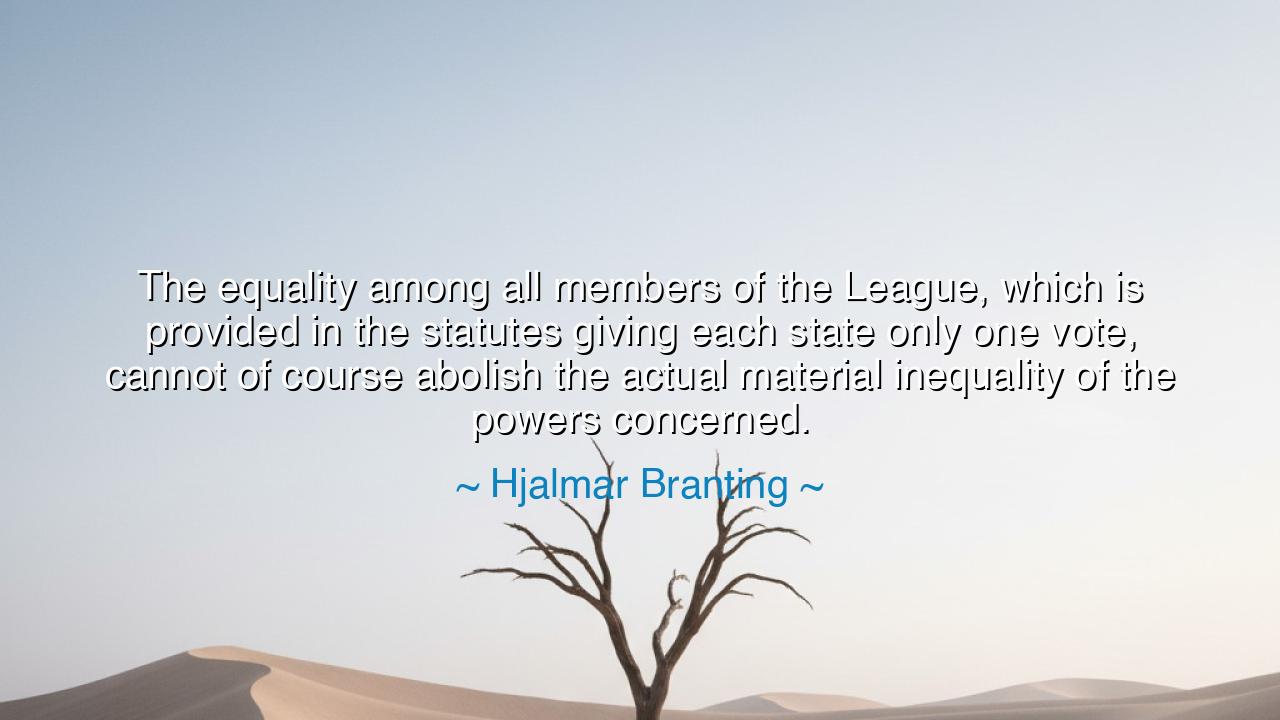
The equality among all members of the League, which is provided
The equality among all members of the League, which is provided in the statutes giving each state only one vote, cannot of course abolish the actual material inequality of the powers concerned.






In the solemn and discerning words of Hjalmar Branting, statesman, peacemaker, and one of the founders of modern international diplomacy, we find a truth as enduring as the struggle for justice itself: “The equality among all members of the League, which is provided in the statutes giving each state only one vote, cannot of course abolish the actual material inequality of the powers concerned.” These words, spoken in the early days of the League of Nations, pierce through the veil of political idealism and expose the enduring tension between principle and power, between the equality of law and the inequality of reality. Branting, a man of both heart and reason, understood that while institutions may declare equality, the world itself is built upon imbalances of strength, wealth, and influence.
The origin of this quote lies in the aftermath of the First World War—a time when nations, exhausted by bloodshed, sought to bind themselves together under the banner of peace. The League of Nations, founded in 1920, was born of hope: a council of nations that would settle disputes through dialogue rather than destruction. Its charter declared that all members—large or small, rich or poor—would have one vote, a symbol of sovereign equality. Yet Branting, ever the realist and philosopher, saw what others preferred to ignore. He knew that moral equality does not erase material inequality. The great powers—Britain, France, Japan, and others—still held dominion over vast empires, their voices carrying a weight no statute could neutralize. Thus, even as nations spoke as equals, some whispers still shaped the world more deeply than others’ cries.
This truth, though uttered in the language of diplomacy, echoes a universal principle of human life. Equality in law does not guarantee equality in power. We may all be equal before the law, equal in dignity, and equal in rights—but history, wealth, geography, and circumstance ensure that some wield greater influence than others. Branting’s insight warns against the illusion that equality written on parchment is enough to balance the scales of reality. True equality requires not only moral declaration but structural courage—the will to confront and correct the forces that sustain injustice. To give every man one vote is noble; to ensure that each man’s voice carries the same strength is the work of generations.
Consider the story of the ancient Greek city-states, whose assembly at the Amphictyonic League proclaimed that each member would have an equal say in their collective affairs. Yet Athens, the great naval power, and Sparta, the iron fist of the Peloponnesus, could not restrain their ambition. Their strength outgrew their humility, and the League that promised unity was devoured by rivalry. So it was in the modern world as Branting observed: paper laws proclaim equality, but human ambition and material strength still write their own laws in shadow. His wisdom, therefore, is not cynicism—it is caution. He urges humanity to see the truth clearly, that peace cannot be maintained by words alone, but by the just balance of power and conscience.
And yet, Branting’s vision was not hopeless. He was a man of faith in progress—a believer that even imperfect institutions could be stepping stones toward enlightenment. He saw that the League’s symbolic equality was not a lie, but a beginning. By granting every nation a voice, however small, the League taught the world the language of cooperation. In time, that seed of equality would grow—through the ashes of two wars—into the United Nations, where nations still wrestle with the same imbalance he warned of, yet continue striving toward harmony. His words remind us that true equality is not an achievement, but a pursuit, requiring vigilance, humility, and persistence.
Branting’s reflection also holds meaning beyond politics. In families, in workplaces, in societies, we often proclaim equality but fail to confront the unequal realities beneath. The wise must see as he saw—that symbols must be matched by substance. Equality declared must become equality enacted: through education, opportunity, and justice. To ignore inequality is to let peace rot beneath the surface of appearances. To address it with courage is to give peace a foundation strong enough to endure.
So let this teaching stand for all who seek to build fairer worlds: do not mistake the shadow for the sun. Equality in word must lead to equality in deed, or it is but a fragile illusion. Speak the truth even when it wounds comfort, for only in honesty can justice grow. Recognize the disparities that divide the world—not to despair, but to act. As Branting teaches, equality begins not in the promise of perfect balance, but in the commitment to continual striving.
For the world may never be fully equal in strength or wealth, but it can be equal in spirit, in respect, and in compassion. And in that moral equality—in that shared human dignity—lies the only hope that peace, once kindled, may never again be lost.






AAdministratorAdministrator
Welcome, honored guests. Please leave a comment, we will respond soon